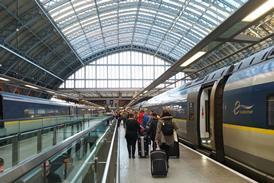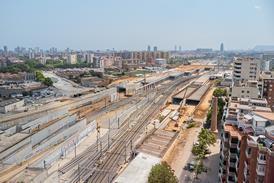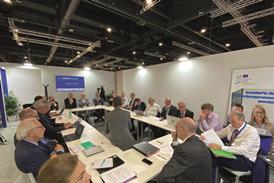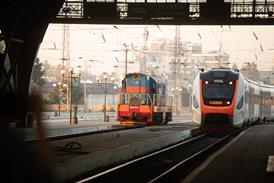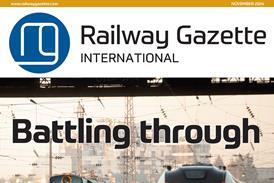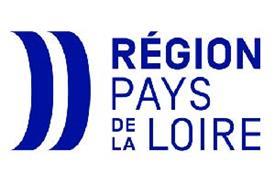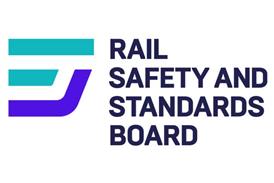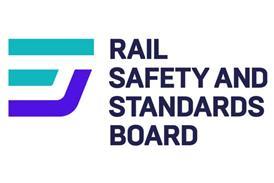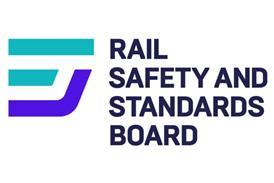INTRO: With the complex relationships of the privatised rail industry driving costs and subsidies to record levels, politicians are asking whether Britain still needs its railways. Murray Hughes looks at recent developments
TEN YEARS have passed since the Railways Act 1993, the legislation passed by John Major’s Conservative government that brought about the most dramatic upheaval ever to affect a national railway. Just three years later Transport Minister John Bowis was trumpeting the benefits of the transformation: ’a railway run by the private sector means new trains, better services, cheaper fares, massive investment and enormous savings for the taxpayer.’
New trains there may be, although in parts of southern England their introduction must await an upgrade to the power supply. Some routes do have better and more frequent services, but performance levels in terms of punctuality and reliability continue to cause concern. Of the other claims, the last has proved most illusory. So much so, in fact, that rail businesses in the UK are reeling from a cost explosion which, if not brought under control, threatens the future of the entire industry.
The House of Commons Transport Committee, which in recent years has been sympathetic to rail, announced on July 14 that it would conduct an enquiry into ’The Future of the Railway’. Questions to be addressed include ’is the present network the right one? If not, how should it be changed?’ In June, Committee Chairman Gwyneth Dunwoody, who is sponsored by the railway trade union RMT, referred to ’the vast amounts of public finance’ being consumed and asked Network Rail Chief Executive John Armitt bluntly ’do we need a railway?’
Infrastructure work has suffered most from runaway costs, best exemplified by the staggering £9·1bn price tag for modernising the West Coast Main Line (p561). Major projects such as the Thameslink 2000 scheme to modernise the north-south cross-London route have been postponed or abandoned, although the government has expressed support for the east-west Crossrail Line 1 ’if it could be proved deliverable and viable’; cost of ’the benchmark scheme’ is put at £10bn and completion is not expected until 2012.
Concern has now switched to the inflated cost of maintenance and renewals, a problem that NR acknowledges and is addressing. A clue as to the causes emerged on August 11 when Deputy Chief Executive Iain Coucher said ’the maintenance contracts we have inherited from Railtrack do not give us a clear understanding of cost and efficiency issues.’
The company has decided to take back direct control of maintenance work from contractors, initially in three out of 20 areas. Maintenance in the Reading area was taken back in-house from Amey on June 22. The East Midlands area, currently maintained by Serco, is now due to return to the fold on January 31 2004. On August 11, NR announced that the Wessex area covering the main line from Waterloo to Southampton and Salisbury, currently maintained by Balfour Beatty, would revert to direct control from November 2003.
Explaining the company’s decision, Coucher said that ’we are accelerating our plans to take direct control of maintenance. Our objective is clear - to drive down maintenance costs and become a more informed and intelligent buyer.’
Regulator on the attack
Overshadowing all this is the Rail Regulator’s Interim Review of track access charges, due to come into effect on April 1 2004 for a period of five years. In a consultation document published on July 24, Regulator Tom Winsor revealed that his consultants had identified savings of £600m in the first year of the new regime, rising to £1bn in 2005-06.
Immediate savings are expected to come from changes in asset management policy, with longer-term economies achieved by NR ’better managing its contractors and eliminating waste and inefficiency within the company’. In fact, NR’s business plan published in March envisaged substantial increases in spending on maintenance and renewals, peaking at no less than £6·4bn in 2005-06. The company issued a revised business plan on June 30, indicating that it would achieve ’overall efficiencies equivalent to 20% of costs by 2006-07’.
Winsor believes that efficiency savings could reduce costs by 30% to around £4bn a year, not just by better management but through a reduction in activity levels. His view at the moment is that the final Interim Review settlement to be announced in December should fund only those activities needed to maintain ’the safe and reliable operation of the network’.
Refranchising progress
Given that Strategic Rail Authority Chairman Richard Bowker expects to present a case for a continued high level of state funding for the national railway in the government’s Comprehensive Spending Review in 2004, there is an urgent need to demonstrate that existing flows of money are being spent wisely. SRA is now moving ahead with reletting the franchises, many of which are due to expire next year, but overall subsidy levels look certain to rise.
Following the award of the South Central franchise to GOVIA on May 12, SRA announced on July 11 that it had signed a three-year replacement franchise with Stagecoach Group for South West Trains, running to February 2 2007, with an option to extend it for up to five years. Government grant will average £165m to £170m a year, more than three times the previous level of support. This is explained by higher leasing charges for Siemens-built Desiro UK EMUs now being delivered, an increase in track access charges to fund the upgraded power supplies for the new trains, plus higher staff and pension costs.
Also in southern England, the franchise covering services in Kent is in the throes of change. On June 27 SRA gave notice to French-owned Connex South Eastern that its franchise will terminate by the end of this year, saying that ’we have lost confidence in their ability to be a competent financial manager’ (RG 8.03 p484). An SRA subsidiary known as South Eastern Trains will take control for a year, paving the way for a new franchise that will include domestic services running over the Channel Tunnel Rail Link to London. Expressions of interest in the ’Integrated Kent’ franchise lasting for eight to 10 years were due to be submitted by September 3, the aim being to complete the deal during 2004.
July 8 saw SRA announce that it was negotiating Heads of Terms with National Express Group to extend the Central Trains franchise by two years to April 2006. Two-year extensions are also under discussion for NEG’s Silverlink commuter service serving London Euston and the Great Northern half of its West Anglia Great Northern franchise that covers suburban services in and out of King’s Cross.
On July 20 a joint venture of Serco and NedRailways took over the Merseyrail Electrics franchise from Arriva under a unique ’partnership’ concession valued at £3·6bn over 25 years. On the same day control of the franchise passed from the SRA to Merseyside Passenger Transport Executive, which will provide funding; revenue risk is taken by the franchisee.
SRA announced on July 31 that a joint venture of French-owned Keolis and FirstGroup had been picked as preferred bidder for the TransPennine Express franchise. Heads of Terms have been signed, and the eight-year franchise with a five-year optional extension will start in 2004. The core of the business is the Leeds - Manchester route, where a 15min interval service is to be worked by trains linking Newcastle and Middlesbrough with Manchester Airport and Scarborough with Liverpool. The deal includes introduction of a fleet of 56 new three-car DMUs valued at £260m, including maintenance facilities.
August 1 saw SRA make a further franchise announcement, with Arriva Trains Ltd chosen as preferred bidder for the replacement Wales & Borders franchise, taking over from incumbents National Express Group and First North Western by the end of this year. Arriva is to run the franchise for 15 years, but has no major investment projects in the pipeline.
In a mid-year assessment of the franchise programme, our newsletter Rail Business Intelligence noted that a record seven franchises were in profit in 2002-03, paying premia back to government: Gatwick Express, Midland Main Line, West Anglia Great Northern, Thameslink, First Great Eastern, GNER and Thames Trains.
Of the others, Virgin CrossCountry received £206·3m in subsidy, with Virgin West Coast taking £188·9m. ScotRail absorbed £192·6m, First North Western £178·2m, and Central Trains £105·9m. Total subsidy for the year was £1321m. Passenger-km totalled 39677 million, giving an average subsidy of 3·3 pence per passenger-km.
CAPTION: A pair of First Great Eastern Class 360 Desiro UK EMUs carried fare-paying passengers for the first time on August 12 between Colchester and Walton-on-Naze. The air-conditioned fleet is due to enter squadron service to and from Liverpool Street at the end of this month Photo: Brian Morrison
CAPTION: Widespread use of Bombardier Electrostar EMUs on GOVIA’s South Central franchise must await upgrading of the 750V DC third-rail power supply
L’explosion des coûts fait dérailler la politique d’expansion
Au cours des dix années écoulées depuis la loi sur les chemin de fer, le Railways Act de 1993, le réseau ferré du Royaume Uni a traversé une série de crises qui ont remis en question la structure complexe de cette industrie privatisée. Des profonds changements ont vu le jour, mais les entreprises ferroviaires font face à une explosion des coûts qui a déjà entraîné l’annulation ou le report de programmes ambitieux visant à l’expansion du réseau. Les dépenses de renouvellement et d’entretien de Network Rail montent en flèche tout comme les subventions versées aux franchises non rentables. Avec le Rail Regulator au bord de l’achèvement, pour la fin de l’année, du rapport intérimaire sur les tarifs d’accès à l’infrastructure, les directeurs de réseau font des pieds et des mains pour tenir à nouveau les dépenses sous contr

